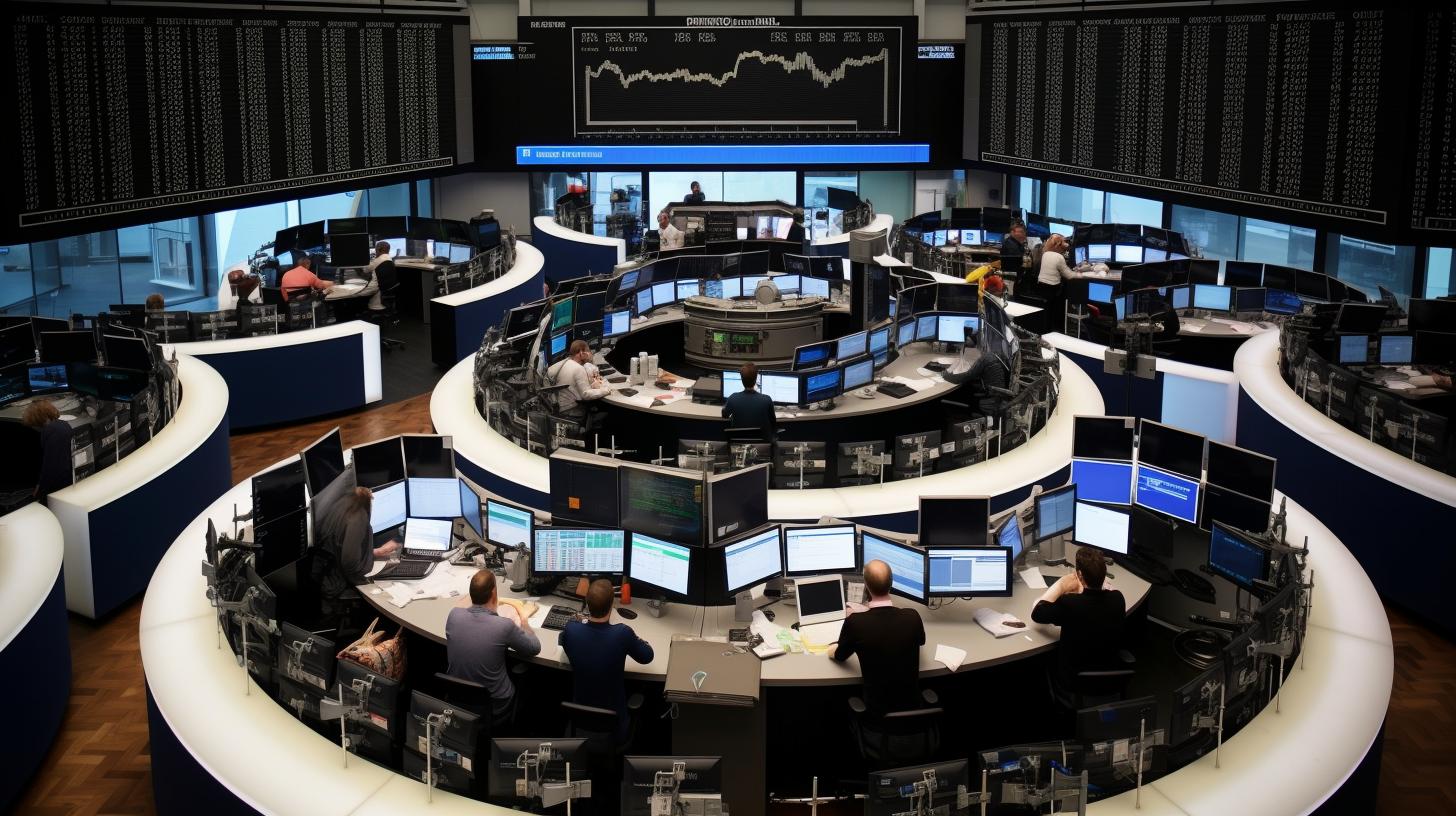European stock markets traded in a mixed fashion on Monday as investors navigated between better-than-expected German inflation numbers and persistent concerns about Chinese economic growth. German wholesale prices showed signs of improvement, offering a minor boost to European investors. However, the country’s struggle with weak trading and a decline in its manufacturing and construction sectors continue to weigh on the largest economy in the eurozone. Meanwhile, worries about China’s debt-laden property sector cast a shadow on global economic recovery. The possibility of further interest rate hikes in the US also added to concerns. Additionally, the US retail sector dominated quarterly earnings in Europe, providing investors with crucial insights into the health of consumer spending. Oil prices retreated amid fears of China’s economic recovery faltering and a stronger dollar.
European Stock Markets Trade Mixed as Investors Digest German Inflation Numbers
European stock markets displayed a mixed performance on Monday as investors processed the release of better-than-expected German inflation data alongside persistent concerns surrounding Chinese economic growth. The DAX index in Germany traded 0.1% higher, while the CAC index in France dropped 0.1% and the FTSE index in the UK fell 0.4%. The positive news from Germany came in the form of a 0.2% decrease in wholesale prices in July, surpassing the expected 1.4% drop. This indicates some signs of life in the German economy, which has been suffering from weak trade with China and a decline in manufacturing and construction sectors. However, the annual fall of 2.8% reflects the ongoing challenges faced by the country’s economy. In addition, concerns about the potential rise in US interest rates following stronger-than-expected US inflation data last week continue to dampen global economic sentiment.
German Wholesale Prices Show Signs of Improvement, Boosting European Investors
European investors received a minor boost on Monday as German wholesale prices showed signs of improvement. The 0.2% decrease in prices in July was considerably better than the anticipated 1.4% drop, hinting at a revival in the German economy. However, the economy still grapples with the consequences of weak trading with its key partner, China, and a slump in the manufacturing and construction sectors. The annual fall of 2.8% highlights the ongoing challenges faced by the largest economy in the eurozone. Furthermore, the possibility of US interest rates rising further, spurred by stronger-than-expected US inflation data, is expected to have an adverse impact on the global economy. These factors need to be carefully monitored by investors as they navigate the current market landscape.
Concerns Surrounding China’s Property Sector Weigh on Global Economy
Despite the positive news regarding German wholesale prices, concerns about China’s debt-laden property sector continue to weigh heavily on the global economy. One of China’s largest developers, Country Garden, warned of a hefty $7.6 billion loss in the first half of 2023, causing its stock to reach a new record low. The company’s difficulties in meeting its debt obligations, as evidenced by the suspension of trading in 11 onshore bonds, raise fears of a possible default and further headwinds for China’s economic recovery from the impacts of the COVID-19 pandemic. China holds the position of the world’s second-largest economy and is a significant driver of regional growth, as well as a crucial market for Europe’s largest companies. The ongoing challenges in China’s property sector should be closely monitored, as they can have far-reaching implications for the global economy.
U.S. Retail Sector Dominates Quarterly Earnings in Europe
Although there are few tier-one companies set to report earnings in Europe on Monday, the US retail sector is expected to dominate quarterly earnings announcements. Several major US retailers are scheduled to release their results, providing investors with important insights into the health of consumer spending, a significant driver of the US economy. These earnings reports will be closely watched as they can offer indications of overall economic strength and consumer sentiment. The performance of the US retail sector has always been closely tied to the health of the US economy, and any surprises or disappointments in these earnings reports could lead to market volatility.
Oil Prices Retreat as Dollar Strengthens and China’s Economic Recovery Falters
On Monday, oil prices retreated due to concerns about China’s faltering economic recovery and a stronger US dollar. China’s struggle to recover from the economic impacts of the COVID-19 pandemic has raised doubts about its demand for oil. Additionally, a stronger US dollar makes oil more expensive for international buyers, potentially reducing demand. The release of US producer price index data, showing a climb to a five-week high, has also contributed to the retreat in oil prices. This increase in inflation creates concerns about the potential impact on crude demand. After seven weeks of consecutive gains on tightening supply from OPEC+ output cuts, profit-taking seems to be the prevailing sentiment in the market. It is important for investors to closely monitor the developments in China’s economic recovery and the strength of the US dollar, as they can significantly impact oil prices.
In summary, European stock markets traded in a mixed fashion as investors grappled with better-than-expected German inflation data and concerns about Chinese economic growth. The slight improvement in German wholesale prices provided a boost to European investors, but the challenges facing the German economy, such as weak trading with China and a decline in key sectors, remain. Worries about China’s debt-laden property sector added to the cautious sentiment, as one of the country’s largest developers faced significant losses and potential debt defaults. The US retail sector dominated quarterly earnings in Europe, with investors closely monitoring the performance of major US retailers for insights into consumer spending and overall economic strength. Oil prices retreated as China’s economic recovery faltered and the US dollar strengthened, raising concerns about demand and making crude more expensive for international buyers. Market participants should stay vigilant as these factors can sway global economic sentiment and market volatility.
Analyst comment
Neutral news: European stock markets traded mixed as investors balanced positive German inflation numbers with concerns about Chinese economic growth. German wholesale prices showed signs of improvement, offering a minor boost to European investors. However, challenges facing the German economy and concerns about China’s debt-laden property sector dampened sentiment. The US retail sector dominated quarterly earnings, providing crucial insights into consumer spending. Oil prices retreated amid fears of China’s economic recovery faltering and a stronger dollar.
As an analyst, the market is likely to remain cautious and volatile as investors weigh the positive and negative factors. The challenges in the German economy and concerns about China’s property sector can put a strain on European markets. The performance of the US retail sector and the strength of consumer spending will be closely watched for indications of overall economic strength. Oil prices will be influenced by developments in China’s economic recovery and the strength of the US dollar, impacting global demand.













